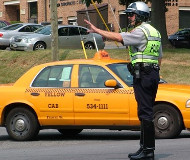Article from: www.thenewspaper.com/news/51/5103.asp
12/13/2016
North Carolina Court Says Drivers Can Ignore Police Signals To Stop
To convict suspected drunk driver, North Carolina Appeals Court says motorists can ignore directions of a cop standing in middle of road.
 If a police officer stands in the middle of the road waving his hands for a motorist to stop, the North Carolina Court of Appeals says that motorist should feel free to ignore him and keep on driving. That is the upshot of a ruling last week that held a motorist who pulled over after being ordered to do so by a Burlington police officer on September 25, 2013 was acting voluntarily.
If a police officer stands in the middle of the road waving his hands for a motorist to stop, the North Carolina Court of Appeals says that motorist should feel free to ignore him and keep on driving. That is the upshot of a ruling last week that held a motorist who pulled over after being ordered to do so by a Burlington police officer on September 25, 2013 was acting voluntarily.
Officer Blake Johnson received an anonymous tip that a known criminal was at 402 Brooklyn Street that day when he saw the pickup truck driven by Joshua Ryan Wilson leaving that location. Standing in the middle of the road, Officer Johnson waved his arms, commanding Wilson to stop his truck because so he could ask a few questions.
Wilson turned out not to be the suspect he was looking for, but Wilson smelled of alcohol and was busted for drunk driving. Wilson fought the charges on the grounds that the officer had no reason to order him to stop. Prosecutors countered that Wilson was never "seized" because the officer made no show of force. It was a voluntary encounter. The trial judge and a majority of appellate judges agreed.
"The fact that Wilson was in a truck while Officer Johnson was on foot and not blocking the road indicates that Wilson's movement was not restricted," Judge Linda Stephens wrote for the appellate majority. "The trial court found that Officer Johnson was alone on the scene, he did not draw his weapon, and his lights and sirens were off. The officer also did not touch Wilson or use any language or tone which would indicate that compliance with his request would be compelled."
Under US Supreme Court precedent, the question of whether a reasonable person would feel free to ignore the officer's direction and keep on driving determines whether the encounter was voluntary, or whether it was a seizure governed by the rules of the Fourth Amendment. Here, the judges insisted that a state law mandating compliance with the directions of a law enforcement officer did not apply because the officer's hand movements were not those of an officer directing traffic.
"Considering the totality of the circumstances, Officer Johnson's hand motions were not so authoritative or coercive that a reasonable person would not have felt free to leave," Judge Stephens concluded.
Judge Chris Dillon found it absurd to think a motorist should be able to read a police officer's mind to determine whether a hand motion was a genuine command or an optional request to chat.
"I believe that any reasonable motorist in defendant's position -- seeing a uniformed officer standing next to a marked patrol car waving his arms, gesturing to the motorist to stop -- would feel compelled to stop, as defendant did here," Judge Dillon wrote in a dissenting opinion. "The subjective intent of the officer is irrelevant in this analysis."
The ruling confirms Wilson's sentence, which includes 90 days in jail, 16 months probation, 24 hours of community service, $2737 in court fees and fines, and a license suspension. A copy of the ruling is available in a 150k PDF file at the source link below.
Source: North Carolina v. Wilson (Court of Appeals, State of North Carolina, 12/6/2016)
Permanent Link for this item
Return to Front Page
 If a police officer stands in the middle of the road waving his hands for a motorist to stop, the North Carolina Court of Appeals says that motorist should feel free to ignore him and keep on driving. That is the upshot of a ruling last week that held a motorist who pulled over after being ordered to do so by a Burlington police officer on September 25, 2013 was acting voluntarily.
If a police officer stands in the middle of the road waving his hands for a motorist to stop, the North Carolina Court of Appeals says that motorist should feel free to ignore him and keep on driving. That is the upshot of a ruling last week that held a motorist who pulled over after being ordered to do so by a Burlington police officer on September 25, 2013 was acting voluntarily.